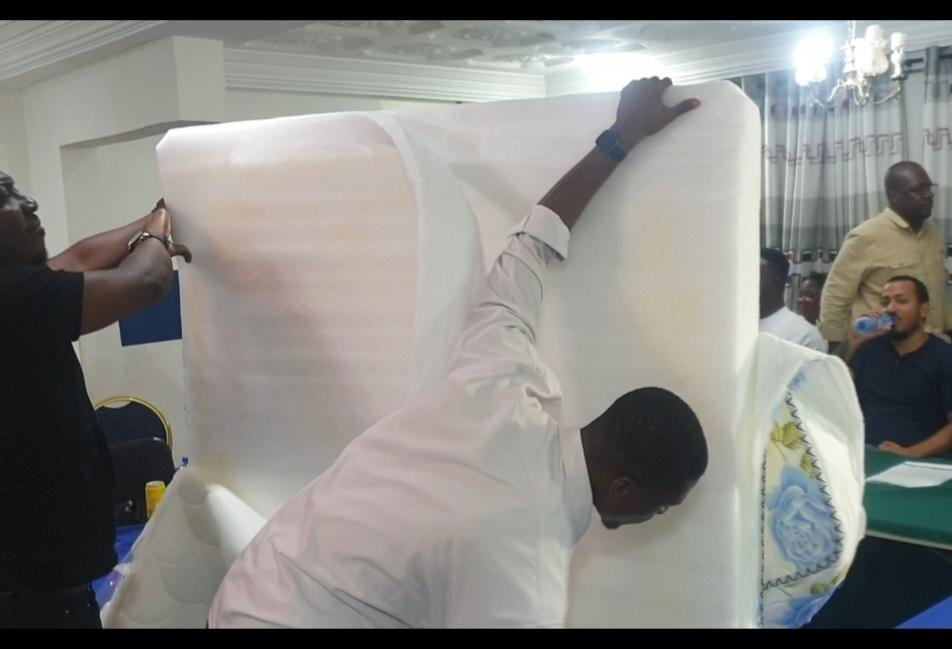News
Young people are losing trust in political leaders – Afenyo-Markin

Minority Leader in Parliament, Alexander Afenyo-Markin, has warned that young people in Ghana are gradually losing trust in political leaders, a situation he believes could threaten the country’s democracy if not addressed.
Speaking at a programme organised by the Centre for Democratic Development (CDD), the Minority Leader commended the organisation for its contribution to strengthening democracy, stressing that civil society groups play a crucial role in Ghana’s governance.
He, however, disagreed with suggestions for the creation of a Second Chamber of Parliament, made up of chiefs or elites, to improve law-making.
According to him, Ghana as a unitary state does not need another chamber but rather more resources to strengthen the work of the existing Parliament and a more proactive Council of State.
Mr. Afenyo-Markin admitted that there was growing apathy and inertia in governance, saying many citizens viewed politicians as corrupt, while political leaders also failed to demand accountability from citizens.
This, he said, had created a cycle of impunity.
He cited past social intervention programmes, from the Rawlings Poverty Alleviation Fund through to Kufuor’s MASLOC, Mills, and Akufo-Addo’s empowerment schemes, explaining that most beneficiaries never paid back loans.
He said this culture of non-payment had turned such initiatives into political patronage, where citizens saw government support as free gifts.
Sharing his own experiences, the Minority Leader revealed that beneficiaries in his constituency often refused to repay loans for fishing, taxi operations, and small businesses, insisting they were “freebies.”
He described this as a national attitude problem that undermines development, warning that without a culture of responsibility, the country’s resources would continue to leak.
On the proposed 24-hour economy, Mr. Afenyo-Markin said the idea was good for private sector growth but questioned how it would work if people still refused to repay funds or be accountable.
He also raised concerns about education and culture, criticising international schools for failing to teach Ghanaian languages. He said this created a disconnect between young people and their culture, noting that many final-year students he had interacted with were unaware of basic government structures, such as ministries and their functions.
The Minority Leader further expressed worry about the abuse of political power, where successive governments allegedly used power for revenge by dismissing public servants or even judges on partisan grounds. He cautioned that if such practices continued, future governments would repeat them, undermining the country’s democratic foundations.
Mr. Afenyo-Markin warned that young people were increasingly frustrated with the political class, both NPP and NDC, and that social media could amplify their anger to the point of rejecting democracy altogether.
He assured, however, that the Minority’s role was not to obstruct government but to provide constructive criticism and work together to build stronger democratic institutions. Having served in government before, he said he understood its challenges and preferred collaboration over conflict.
He urged CDD to continue its advocacy despite criticism, and called on political actors to avoid vindictiveness, protect national institutions, and make democracy more attractive for the youth.
By Jacob Aggrey
News
Watch your mattresses!…they can cause chronic back pain, other health disorders

Local mattress manufacturers have raised serious concerns over the influx of substandard mattresses, warning that these products pose significant health risks to consumers and threaten the sustainability of Ghana’s mattress industry.
At a press briefing held in Kumasi on Tuesday, manufacturers accused unregistered foreign entities, particularly Chinese firms, of flooding the market with cheap mattresses made from polystyrene.
Mr Yaw Ampem Darko, a spokesperson for the local manufacturers, warned that prolonged use of substandard mattresses, especially those made with polystyrene, could result in chronic back pain, musculoskeletal disorders, poor posture, and diminished sleep quality.
These health implications, they stressed, were not always immediately evident but accumulate over time, especially among vulnerable populations such as children and the elderly.
This material, typically used for packaging, is considered unsuitable and unsafe for bedding.
According to industry leaders, these sub-standard products have been circulating for at least five years, gaining traction among unsuspecting consumers due to their unusually low prices.
“These mattresses are being sold at suspiciously low prices, luring unsuspecting consumers who are unaware of the health dangers.”
“We are not just protecting our businesses; we are protecting Ghanaian lives. The government must act swiftly to stem this tide before more citizens fall victim to these dangerous products,” Mr Yaw Ampem Darko stated.
The Ghana Standards Authority (GSA) has acknowledged the issue and, in response, announced a nationwide enforcement campaign aimed at clamping down on the production, distribution, and sale of substandard mattresses.
The campaign, which was scheduled to take effect from September 30, 2025, was empowered by the GSA Act, 2022 (Act 1078), which authorises the Authority to seize and seal non-compliant products and impose sanctions on offenders.
In a statement signed by the Director General of the GSA, Professor George Agyei, the authority cited Sections 29 and 43 of the Act, reiterating that all mattresses sold in Ghana must meet established national standards or face confiscation.
The statement further emphasised that mattresses failing to meet these standards not only compromise sleep quality but also contribute to long-term health complications, including spinal and neck pain.
Despite the GSA’s commitment, manufacturers have expressed frustration over delays in implementation and called for stronger enforcement mechanisms.
They urged the GSA to work in close collaboration with the Customs Division of the Ghana Revenue Authority and national law enforcement agencies to identify and prosecute violators of Ghana’s quality standards.
Manufacturers are also appealing to consumers to remain vigilant and prioritise their health by verifying that any mattress they purchase bears the GSA certification mark.
Moreover, they caution the public against purchasing suspiciously cheap mattresses that lack proper labelling or identifiable branding, as these were often indicators of substandard or counterfeit products.
As the official enforcement deadline had expired with no show, the local producers insisted that much more than business interests were at stake.
They argued that without swift and sustained action, the health and safety of Ghanaian consumers would continue to be compromised.
“Public awareness, strict enforcement, and collaboration among regulatory bodies are essential if we are to protect the integrity of the local industry and the wellbeing of the Ghanaian people,” Mr Darko indicated.
From Kingsley E. Hope, Kumasi
Join our WhatsApp Channel now!
https://whatsapp.com/channel/0029VbBElzjInlqHhl1aTU27
News
Raissa Initiative demands harsher punishment for sexual abusers of girls

The Founder of the Raissa Child Protection Initiative, Ms Raissa Sambou, has urged authorities to impose severe punishment on individuals, including teachers and guardians, who sexually abuse young girls.
Speaking in an interview to mark this year’s International Day of the Girl Child (October 11), Ms Sambou condemned the increasing cases of sexual exploitation involving minors, describing such acts as “heartless, criminal, and a total betrayal of trust.”
She noted that those entrusted with the care and education of children must not be the same people who violate them, stressing that “anyone found guilty of abusing a girl child must face the full rigours of the law without leniency.”
The International Day of the Girl Child is observed annually to promote the rights of girls, empower them to reach their full potential, and draw attention to the challenges they face worldwide.
Ms Sambou lamented that poverty continues to push many young girls into vulnerable situations, exposing them to exploitation.
She expressed concern that some headmasters, teachers, and community members who should protect girls rather take advantage of them.
“This must stop immediately. The safety of every girl must never be compromised,” she said, urging the public to report all forms of abuse to the appropriate authorities and called for swift action by law enforcement agencies against perpetrators.
Addressing girls directly, Ms Sambou encouraged them to take their education seriously and to believe in their potential.
“It is possible to be young and responsible. Your future is bright, protect it, believe in it, and never let anyone dim your light,” she advised.
She further urged girls to choose their friends wisely, stay disciplined, and speak up if anyone makes sexual advances toward them.
Ms Sambou concluded with a rallying call for collective action, saying “speak up, protect them, and empower them. Together, we can end the sexual exploitation of girls.”
By Esinam Jemima Kuatsinu
Join our WhatsApp Channel now!
https://whatsapp.com/channel/0029VbBElzjInlqHhl1aTU27














